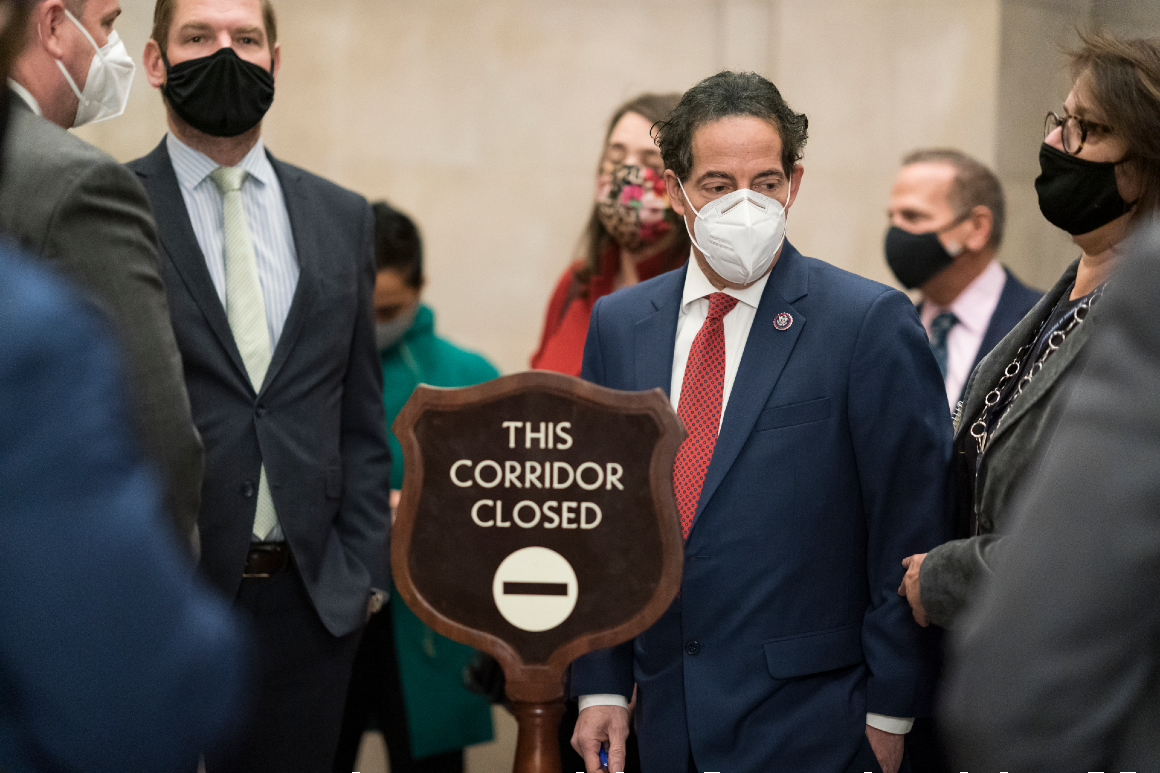The House Democrats prosecuting Donald Trump’s impeachment will mount arguments akin to a “violent crime” case, constructing a “succinct” narrative of the Jan. 6 insurrection that begins weeks earlier as the former president mounted a campaign to delegitimize his 2020 election defeat, top aides said Tuesday.
The aides, speaking on condition of anonymity to describe mechanics of the Senate’s trial, emphasized that they intend to present a visually gripping version of events that draws on the personal experiences that will resonate with many of the lawmakers who fled the violent insurrectionists.
It will not resemble the technical constitutional arguments that they expect to be the dominant focus on Tuesday, when Trump’s legal team attempts to dismiss the case on procedural grounds on the trial’s opening day.
“It’ll be more like a violent crime criminal prosecution, because that is what it is,” one of the advisers said. “It will tell the story, the full story of … how the president incited it. Jan. 6 was the culmination of that incitement with his conduct leading up to it giving meaning and context to his words.”
The preview from the House impeachment managers comes as the Senate kicks off the trial on Tuesday with a four-hour debate on whether putting a former president on trial is constitutional — the first step in a trial that is only expected to last a week, and that seems likely to result in Trump’s acquittal.
While the Senate is expected to uphold the trial’s constitutionality on Tuesday, most GOP senators are likely to vote that the trial is unconstitutional. Last month, 45 out of 50 Senate Republicans voted for a motion that would have effectively nixed the trial on procedural grounds. The vote foreshadowed Trump’s likely acquittal, given that at least 17 Republicans would have to join all Democrats in order for Trump to be convicted.
The top aides to the House’s impeachment managers said they are confident they will prevail on the constitutional vote and will press senators to consider the matter settled, urging them to judge Trump on the facts of their case, rather than continuing to cling to the constitutional argument.
Still, the procedural objections are a key theme of Trump’s defense strategy. His lawyers, led by Bruce Castor, have maintained that the Constitution does not explicitly allow for a former president to be put on trial for impeachment charges.
The House impeachment managers are expected to cite scattered precedents for such an action as well as the bipartisan consensus among legal scholars who say that it is, in fact, a constitutional exercise. Supporters of that argument note that the Constitution specifically states that the Senate has “the sole power to try all impeachments.”
The arguments Tuesday will be led by Rep. Jamie Raskin (D-Md.), the lead House manager, followed by Reps. Joe Neguse (D-Colo.) and David Cicilline (D-R.I), key members of the House Judiciary Committee.
The managers plan to name-check Chuck Cooper, the longtime GOP-aligned lawyer who wrote in a Wall Street Journal op-ed that the Senate has the authority to convict Trump even though he is now a private citizen.
The managers also intend to rebut Trump’s defense that he exhorted the would-be rioters to act “peacefully,” emphasizing that despite his use of the term “once during his speech,” it came amid the context of a months-long campaign in which Trump used false claims to argue that the election has been stolen, and that he repeated on Jan. 6 knowing that at least some in the crowd had violent intentions.
The managers also plan to undercut Trump’s lawyers’ effort to seize on remarks from prominent Democrats that they allege also incited violence. Though some Democrats may have made “errant” comments, the aides noted, none spent months mounting a concerted campaign based on lies about voter fraud while occupying the unique position as commander-in-chief.
The aides said they have no illusions that Senate Republicans will break ranks in large enough numbers to convict Trump, but that the strength of their case will make it difficult for them to acquit him: “We are walking into this thing with our eyes open.”





















